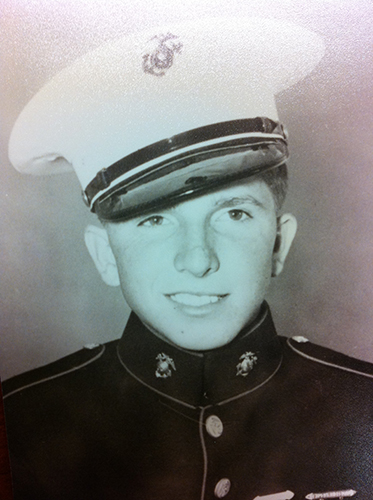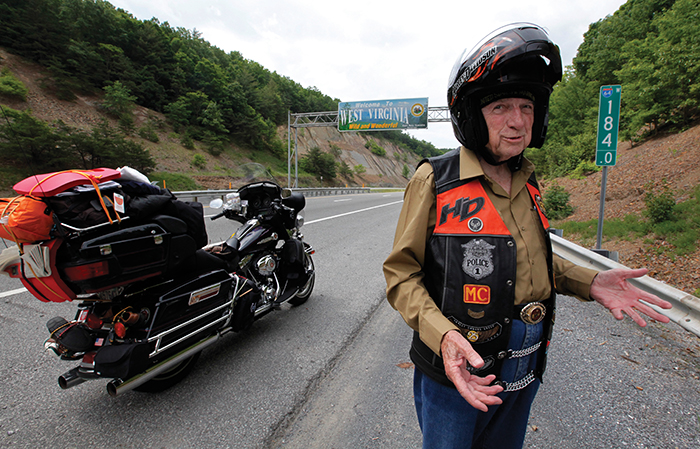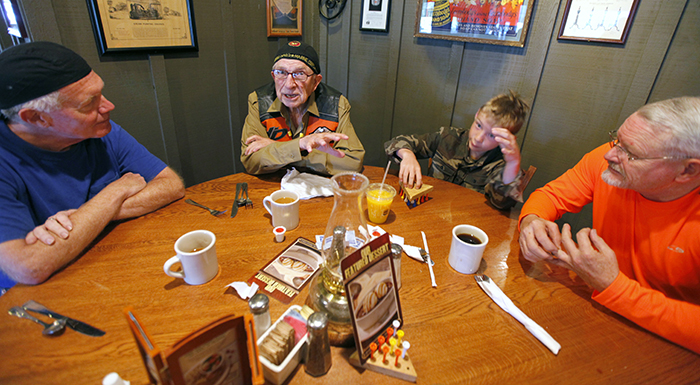 With Marines still battling the Japanese for control of other parts of Iwo Jima in early 1945, a two-engine Navy transport plane, loaded with people and equipment, begins its takeoff roll along the single airstrip on the volcanic Pacific island.
With Marines still battling the Japanese for control of other parts of Iwo Jima in early 1945, a two-engine Navy transport plane, loaded with people and equipment, begins its takeoff roll along the single airstrip on the volcanic Pacific island.
A young Kentuckian and Marine Corps radio operator named E. Bruce Heilman is one of the passengers of the R-4, which, as it begins inching into the sky, is caught by a sudden crosswind from the right. In a terrifying instant, Heilman and others realize that cargo has been improperly stored, and begins to shift in flight.
Fifty feet is the highest altitude the aircraft attains before the tail slams into the ground. The suddenness of it all, plus the typical noise inside the fuselage, means prayers are being said silently.
Next, the left wingtip meets the earth, clawing an angry furrow for hundreds of feet as it disintegrates and pulls the rest of the plane and its trembling cargo to the ground. The nose smashes into the ground.
Heilman, a Baptist who would go on to become president and then chancellor of the University of Richmond, remembers bracing for the inevitable fire ball that was sure to engulf them. He had seen it many times during the Pacific war.
“Ninety-nine times out of 100 the plane would have caught on fire and nobody would have gotten out,” Heilman, now 88, says.
To be sure, there were broken wings, a crumpled fuselage, lots of broken glass and the noise of smashed metal settling. But there was no fire.
Answered prayers? Yes, but Heilman also is a believer in prayer mixed with common sense and action.
“Fortunately, our pilot had enough sense, when the wing hit the ground, to cut the engine and that saved our lives.”
As if that weren’t enough of a scare and adventure for a lifetime, Heilman, like other Americans in uniform at that time, would have plenty more scrapes to endure. Among other far-flung Pacific locations, his service took him to the battle of Okinawa and later to Hiroshima and Nagasaki.
No wonder, then, that Heilman will not be deterred from his annual solo motorcycle tour. He left for his last trip — a 5,000-miler from Virginia to Alaska — on June 8. As usual there were plenty of family, friends and media looking on, including fellow members of First Baptist Church in Richmond.
“They always say ‘we wish you wouldn’t go,’” Heilman says a couple of days before departing on his 1,200-pound Harley Davidson.
They see a man approaching his 90s heading out into a nation teeming with traffic, construction and glaciers. Heilman sees Marines struggling up Mount Surabachi, he sees radioactive Hiroshima dust on his GI boots, and he remembers the plane crash that didn’t kill him.
A few solo motorcycle jaunts on (mostly) paved highways in the United States and Canada? How could that possibly rattle him?
 “Sometimes you just have to do it,” he says, “and that’s what I’m doing.”
“Sometimes you just have to do it,” he says, “and that’s what I’m doing.”
For Heilman it’s always been about doing. It’s been about raising a family while earning advanced degrees and embarking upon a distinguished career. It’s been about fundraising while on vacations and giving two or three speeches while riding to Alaska. It’s been about nurturing relationships with the military and fellow veterans. All the while, he serves on at least a dozen boards, including ABPnews/Herald.
How does he keep doing all this at 88? Heilman answers with a question: how can he not?
“I have lived through the Great Depression and World War II — I find if I don’t have a little challenge out there, life gets a little dull.”
Sheer energy
Life certainly wasn’t dull immediately following the war. Heilman married and in short order there were mouths to feed — five children.
So he went to school — and with gusto. He attended schools like Peabody College, the universities of Omaha, Kentucky and Tennessee, and what is now Campbellsville University. Along the way he picked up bachelors, masters and doctorate degrees — and all without a high school diploma.
During his schooling he discovered a knack for teaching and especially for helping others teach. Those discoveries led to a career in higher education administration that culminated in university presidencies and renown as a premier fundraiser.
He was president of Meredith College in Raleigh, N.C., before becoming president of the University of Richmond in 1971 — a post he held until he became chancellor in 1986.
During his tenure as UR’s president, he boosted its endowment by $200 million.
Heilman says such accomplishments were all about relationships — building and keeping them. Those who saw him at work say it was also sheer energy.
“He was all over the country raising money for the university,” says David Burhans, special assistant for advancement at UR and a former university chaplain who worked under Heilman for decades.
“We almost never saw him. We just lived by phone messages and memos back and forth to each other.”
Working vacations
Nothing has really changed for Heilman. In June, he embarked on his Patriot edition Harley-Davidson Electra Glide Ultra Classic for a 5,000-mile ride from Richmond to Alaska. But he had more than sightseeing on the agenda: stops were planned in places like Louisville and Kansas City to see old friends and colleagues — and to seek contributions from University of Richmond graduates. Other stops and speaking engagements included speaking at a war museum in Canada and a civic club at the University of Alaska.
Those appointments, along with planned service stops for the motorcycle, are part of what keep Heilman going from mile to mile. It’s how he has covered tens of thousands of miles and been through 48 states — Alaska will make it 49 — since he began riding again at age 71.
It’s always been like that, recalls son Tim Heilman, a fundraiser at Campbellsville University.
He remembers the years when his father was presi-dent of Meredith College. The entire family jammed into the family sedan heading out for some rest and relaxation in South Carolina. But there was a catch: there were major executives, important alumni and other school supporters in most cities along the route.
So they stopped at each one of them. There was no way his father was going to miss an opportunity to raise money along the way.
“His vacations were always working vacations,” says Tim. “We’d load up the car and make 10 stops from Raleigh to Myrtle Beach.”
So it is that Heilman’s 2014 journey follows that pattern. As long as the University of Richmond wants him to serve, he’ll serve. He says he feels the same about his bike.
“And they will always ask me: ‘When are you going to a retirement home?’ I say as soon as I get a place to park my Harley.”
‘When I get old’
The bike, the road and even the fundraising and speaking events all keep Heilman young. Others see that youthfulness just as much as he feels it.
“He always comes back looking a heck of a lot better than when he left and feeling a lot better than when he left,” Tim says of his father’s annual mega rides.
In its own way, the war has kept Heilman young, too.
 That includes the regular trips to military hospitals to visit young marines and soldiers with shattered bodies. They are often amputees or even multiple-amputees with their hope taken from them.
That includes the regular trips to military hospitals to visit young marines and soldiers with shattered bodies. They are often amputees or even multiple-amputees with their hope taken from them.
It’s yet another role for Heilman: spokesman for the Greatest Generations Foundation, a non-profit group of veterans serving veterans.
Heilman leads veterans of previous wars, some of whom are amputees. He makes the introductions — using his skill as a natural relationship builder to help senior citizens connect young and old. It isn’t long before the young man or woman feels optimism returning: if these old guys lived full lives with a missing leg or arm, maybe he or she can, too.
Then he steps back and watches as the old guys are helped, as well. “They will talk to each other and both experience healing.”
Another job with the Foundation is to lead tours of battlefields in Europe and on Pacific islands so that veterans of those conflicts can experience closure from the psychological wounds of war. He’s led veterans to historic sites like Omaha Beach, Okinawa and Bastogne.
In both settings — hospitals and battlefields — participants in their 80s and 90s experience the feeling of being much younger.
“We revert to being 18 and 19 years old,” Heilman says.
People routinely ask Heilman when he’s going to put down the bike, take off the fundraising hat and just slow down? But why would he when he’s feeling like a young man?
“My bike is a two-wheeler but a lot of people think I’m riding a three-wheeler. I tell them I am saving that for when I get old.”
‘That your bike?’
Plus he just isn’t giving up life on the road — not with the sights, smells and people to be met along the way.
“You see more and you sense more because you can smell” while riding a motorcycle. “When you’re in Texas, you know when you are coming up to the next cattle ranch.”
There was also the guy in Oklahoma City a few years back who approached Heilman as he was having a Coke and sandwich in a parking lot.
“That your bike?” the man asks, as so many people on the road do.
“Yes, sir.”
“Where you from?”
Heilman tells him.
The man then responds with the most astonishing story of running away from home at 13, being in prison, getting out and having his wife divorce him. He got a job in a bakery, liked it and eventually came to own that store and a chain of bakeries. He also raised four daughters.
You don’t meet people like that in church, Heilman says, adding there’s something about encountering an 80-something motorcyclist that seems to get people to open up.
“It’s amazing that people have a story to tell and he just needed to tell me his,” Heilman says.
His motorcycle odysseys and regular exposure to college campuses and uniformed military personnel also have helped him maintain a respect for the character and spirituality of younger generations.
Heilman grew up regularly attending a rural Baptist church and two- and three-week revivals where the message was about not sinning. “I was 18 years old and in the military before I learned religion is about what you do do.”
And that’s what he sees in youth today. “They are good people and I enjoy being around them.”
Yet he’s still regularly questioned: how long can it last? Isn’t he just fortunate to have a sound mind and body at this stage in life?
Heilman agrees some of it may be genetic. But he’s seen others in his family break down and die at much younger ages. To him, just as much of his situation is due to decisions he’s made as it is DNA or luck.
“In life, each of us tends to do what circumstances allow,” he says. “And to me, life is very stimulating, challenging and rewarding.”
But Heilman says he gets it. He understands why his children, members of his church and folks on the road sometimes can’t get their head around the idea of an octogenarian putting tens of thousands of miles on a motorcycle every year.
In fact, back when his late wife gave him his first Harley some 16 years ago, he was a little shocked himself.
“When I started riding at 71, I thought that was pretty old to be riding a Harley,” he says.
But that was then.
“Now, 20 years later, I don’t have any problem with it at all.”
This article originally appeared in Herald, distributed five times a year to contributors to our Annual Fund. Bulk copies are also sent to our Church Champions churches.
